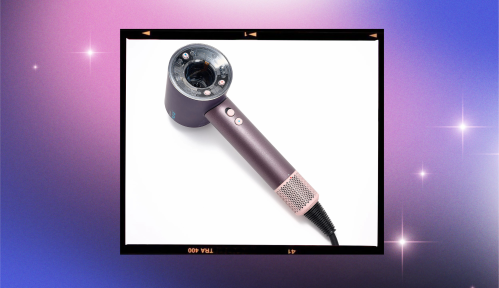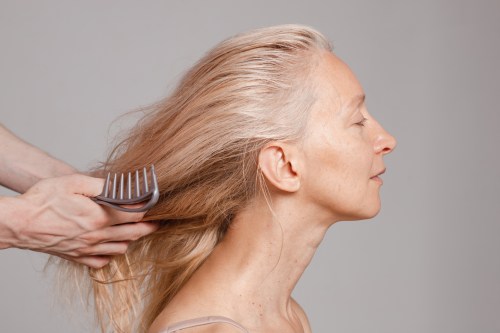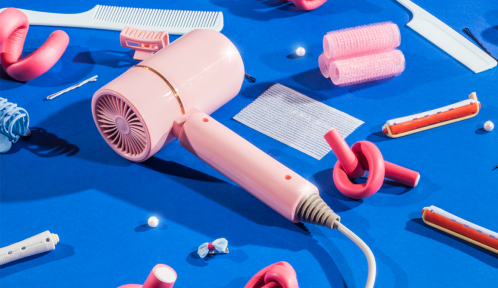Our editors independently select these products. Making a purchase through our links may earn Well+Good a commission
4 Common Reasons Your Hair Might Be Thinning, According to a Dermatologist
From stress to diet deficiencies, a dermatologist shares the most common hair loss causes that could be behind your thinning strands.

It might start in the shower with a larger-than-usual clump of hair in the drain, or in the morning when you notice a few errant hairs on your pillow, or when your ponytail starts to feel slightly slimmer than usual. But no matter when the realization that you’re losing your hair strikes, it’s inevitably accompanied by a barrage of questions flying through your brain, like “WTF?” and “Why is this happening to me???” Trust me—I’ve been there.
First things first: Don’t panic. Hair loss is far more common than you probably realize, and affects more than 50 percent of women at some point throughout their lifetimes. The other good news is that, in many cases, it is fixable.
Before you dive in on solutions, though, you’ll want to figure out the why behind your shedding—which in most cases means scheduling a visit to your dermatologist. “There are innumerable causes of hair loss as well as many different types of hair loss, and the only way to know what type of hair loss [you might have] and what is causing it is to be seen in person by a dermatologist,” says Lindsey Zubritsky, MD, a board-certified dermatologist based in Pittsburgh. If you want answers ASAP, keep scrolling for the four most common hair loss causes that she says could be to blame for that clump in your drain.
1. Stress
Stress causes a type of shedding called telogen effluvium, which is characterized by losing 150 or more strands of hair per day. “When we’re stressed, our adrenal glands produce this hormone called cortisol, and then the cortisone signals our hair follicles to shift from the growth phase, out of growth phase into catagen [a transition phase], and then hair will fall out,” Tess Marshall, ND, a naturopathic doctor who works with hair-growth supplement Nutrafol, previously told Well+Good.
The first way to deal with stress-related hair loss is to try and deal with whatever stressors are hanging out in your life. However, since “be less stressed” isn’t exactly great advice, picking the right products can also help. “One of the targets that increase inflammation and oxidative stress in our hair follicles is coming from the outside world, so when we’re using products that have chemicals in them that disrupt all of our hormone system, that can have a negative effect on our hair,” says Dr. Marshall, who suggests replacing anything with chemicals like sulfates with botanical-based shampoos and conditioners from brands like Verb and Prose.
2. Aggressive hair brushing
If you’re noticing chunks of hair coming out every time you run a brush through your strands, it may be because you’re going too hard. “Brushing your hair too aggressively can result in pulling of the hair at its base or the hair follicle, which is where the hair grows from,” says Dr. Zubritsky. “Constant, repetitive trauma and damage to the hair bulb or hair follicle can result in unrepairable damage, and over time, the hair may not be able to regrow.” The best way to avoid this, she says, is to brush g-e-n-t-l-y, and use your non-brushing hand to hold the hair near the top of your scalp to prevent pulling and tugging. You can also try using a soft brush, like a boar bristle brush or a wet brush to ensure you aren’t doing any further damage.
3. Vitamin D deficiency
“Low levels of vitamin D have been linked to several types of hair loss, including telogen effluvium, an autoimmune condition called alopecia areata, and female pattern hair loss,” says Dr. Zubritsky. “It is much more common than most of us realize.” If you suspect your levels are low, you’ll want to make an appointment with your dermatologist or primary care physician to get things checked. If that’s the case, your best bet is to tweak your diet or add a vitamin D supplement into your routine to help balance things out.
4. Hormones
Add “hair loss” to the list of annoying things we can blame our hormones for (right above mood swings and bloating). “When pregnant women experience hair loss, it is usually due to a condition called telogen effluvium, which is a temporary hair shedding that occurs several months after giving birth due to hormone levels fluctuating,” says Dr. Zubritsky. “There are other causes of telogen effluvium related to hormones, including starting or stopping birth control pills or menopause, for example.” While there aren’t any real treatments for this type of hair loss, for most women it resolves on its own after a few months.
For more hair-loss related intel, check out the video below.
Oh hi! You look like someone who loves free workouts, discounts for cutting-edge wellness brands, and exclusive Well+Good content. Sign up for Well+, our online community of wellness insiders, and unlock your rewards instantly.
Sign Up for Our Daily Newsletter
Get all the latest in wellness, trends, food, fitness, beauty, and more delivered right to your inbox.
Got it, you've been added to our email list.










